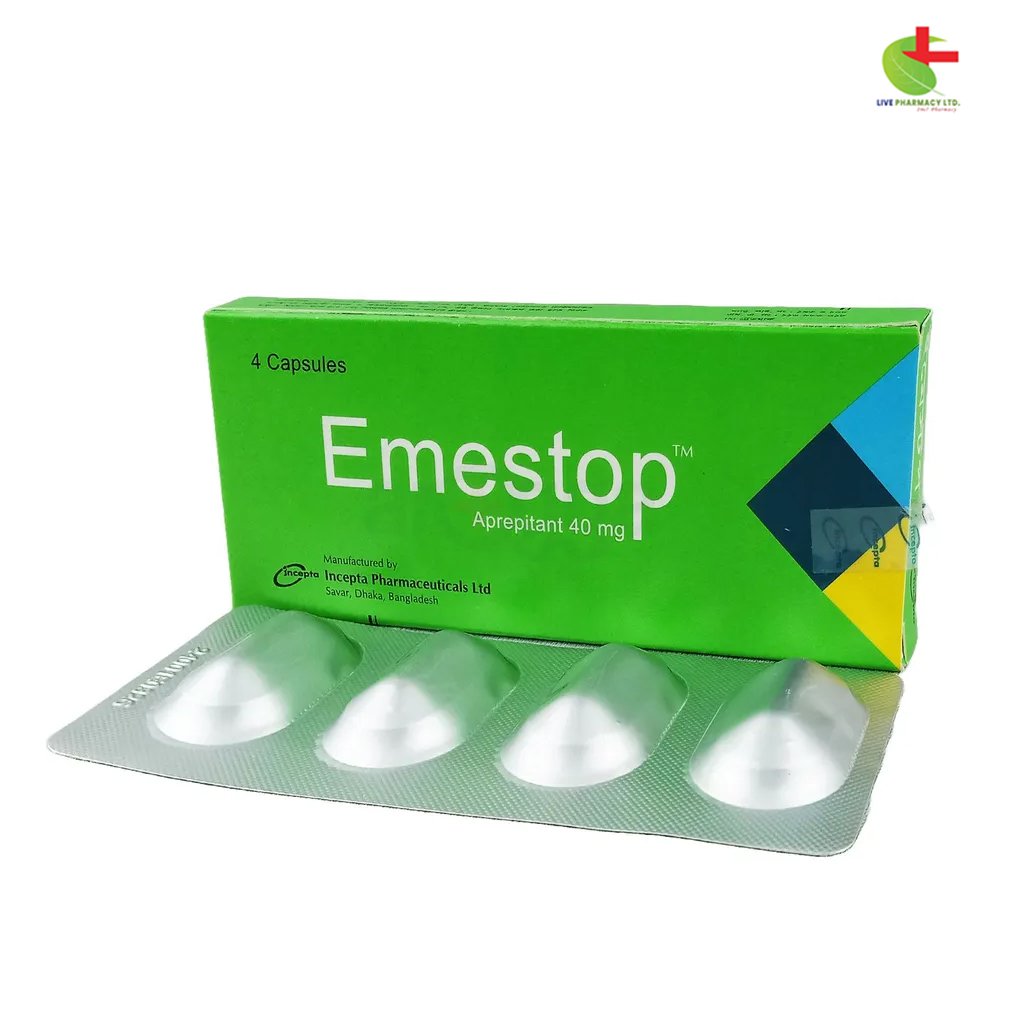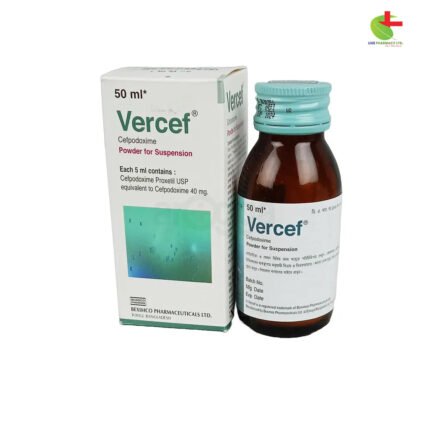Emestop 40
50.00৳ Capsule
- Emestop is an effective anti-emetic medication for preventing postoperative nausea and vomiting (PONV) and chemotherapy-induced nausea and vomiting (CINV).
- It works by blocking neurokinin 1 (NK1) receptors, preventing the effects of substance P, which triggers nausea.
- Administered orally or intravenously, Emestop provides a reliable solution for patients undergoing surgery or chemotherapy.
- Always consult a healthcare professional for appropriate dosage and usage.
 Brand
Brand
|
Incepta Pharmaceuticals Ltd |
|---|---|
 Generics
Generics
|
Aprepitant |
 Type
Type
|
Capsule |
Indications
Emestop is utilized for:
- Prevention of Postoperative Nausea and Vomiting (PONV)
- Prevention of Chemotherapy-Induced Nausea and Vomiting (CINV)
Pharmacology
Aprepitant acts as a selective high-affinity antagonist of human neurokinin 1 (NK1) receptors, which bind substance P—a key neurotransmitter involved in inducing nausea and vomiting. By blocking these receptors, Aprepitant effectively prevents the nausea and vomiting often associated with chemotherapy and postoperative recovery.
Dosage
For Postoperative Nausea and Vomiting:
The recommended oral dose of Aprepitant is 40 mg, taken within 3 hours prior to anesthesia induction.
For Chemotherapy-Induced Nausea and Vomiting:
For Highly Emetogenic Chemotherapy:
- Day 1: 125 mg Aprepitant orally, 12 mg Dexamethasone orally, and 24 mg Ondansetron (5-HT3 antagonist) 30 minutes before chemotherapy.
- Day 2: 80 mg Aprepitant orally, 8 mg Dexamethasone orally.
- Day 3: 80 mg Aprepitant orally, 8 mg Dexamethasone orally.
- Day 4: 8 mg Dexamethasone orally.
Aprepitant should be taken 1 hour before chemotherapy on Day 1, and in the morning on Days 2 and 3. Dexamethasone should be taken 30 minutes prior to chemotherapy on Day 1 and in the morning on subsequent days.
For Moderately Emetogenic Chemotherapy:
- Day 1: 125 mg Aprepitant orally, 12 mg Dexamethasone orally, and 8 mg Ondansetron (5-HT3 antagonist) 30 minutes before chemotherapy, followed by another 8 mg dose 8 hours later.
- Day 2: 80 mg Aprepitant orally, and 8 mg Ondansetron twice a day.
- Day 3: 80 mg Aprepitant orally, and 8 mg Ondansetron twice a day.
Aprepitant is taken 1 hour before chemotherapy on Day 1, with Dexamethasone taken 30 minutes prior. Dexamethasone doses are adjusted to consider potential drug interactions.
Always consult a physician before using this medication.
Administration
Aprepitant can be taken with or without food. There is no need for dosage adjustment in elderly patients.
Always consult a physician before using this medication.
Interactions
Emestop serves as a substrate, weak-to-moderate inhibitor, and inducer of CYP3A4 and induces CYP2C9. Caution is advised when coadministering Emestop with medications metabolized by these enzymes, such as Warfarin, Phenytoin, Ketoconazole, and others.
Additionally, the efficacy of hormonal contraceptives may be reduced during treatment with Emestop and for 28 days following the last dose. Alternative contraception methods should be utilized during and after treatment.
Contraindications
Aprepitant is contraindicated in individuals hypersensitive to any component of the formulation. It should not be used concurrently with Pimozide, Terfenadine, Astemizole, or Cisapride.
Side Effects
Possible side effects include constipation, hypotension, itching, and fever.
Pregnancy & Lactation
Pregnancy Category B: Use during pregnancy is advised only if necessary. It is unknown if Aprepitant is excreted in human breast milk, so a decision must be made to either discontinue nursing or the medication based on individual circumstances.
Use in Special Populations
Renal Impairment: No dosage adjustment is required for patients with renal impairment or end-stage renal disease undergoing hemodialysis.
Hepatic Impairment: No dosage adjustment is necessary for mild to moderate hepatic impairment. There is no available data for patients with severe hepatic impairment.
Overdose Effects
While specific overdose treatment information for Emestop is limited, doses up to 600 mg have been generally well tolerated. Symptoms of overdose may include drowsiness and headache. In case of overdose, Emestop should be discontinued, and general supportive treatment should be provided, as emesis may not be effective due to its antiemetic properties. Emestop cannot be removed through hemodialysis.
Therapeutic Class
Anti-emetic Drugs
Storage Conditions
Store below 30°C, away from light and moisture. Keep out of reach of children.













Reviews
There are no reviews yet.